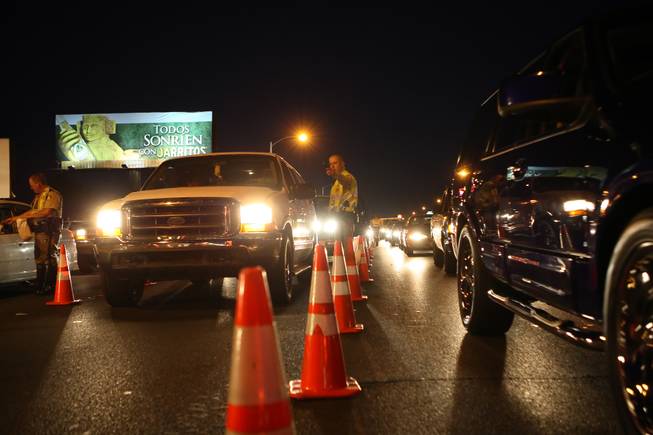
Mona Shield Payne
Drivers wait in line Friday, July 3, 2010, at a Metro Police DUI checkpoint on Nellis Boulevard south of East Lake Mead Boulevard.
Friday, Dec. 30, 2011 | 12:08 p.m.
The Nevada Supreme Court has made it a little tougher to get a drunken driving conviction.
In a 5-2 decision, the court ruled that a method to measure the blood-alcohol level of a suspected drunk driver poses a danger of prejudicing a jury, and the evidence may be inadmissible.
The method, known as retrograde extrapolation, measures the blood-alcohol level hours after an accident and calculates the figure at the time of the accident.
The court's ruling came in the case of Bobby Armstrong, who was arrested in an April 2006 accident in Las Vegas. The driver of another car involved in the accident was injured in the crash.
A blood sample was taken from Armstrong more than two hours after the accident, and it measured an alcohol level of .18 percent. The retrograde extrapolation system estimated that his blood-alcohol level had been higher than 0.08 percent at the time of the accident, which is the amount needed for a drunken driving conviction.
In a majority opinion written by Justice Michael Douglas, the court ruled that many factors must be considered when evaluating the evidence of retrograde extrapolation. Among them are gender, weight, type of food in the stomach, the time between the arrest and the time of the measurement and whether there was only one test.
In the Armstrong case, the court said, many of the factors were unknown.
"And a single blood draw makes it difficult to determine whether Armstrong was absorbing or eliminating alcohol at the time of the blood draw," Douglas wrote.
In his brief to the court, Clark County Deputy District Attorney Bruce Nelson said the effect if the Supreme Court upheld District Judge Stefany Ann Miley would be "to legalize driving under the influence of alcohol when the blood test is not taken within two hours of driving." He said it would declare portions of the drunken driving law unconstitutional.
But the Supreme Court said Nelson's argument went too far.
"Although retrograde extrapolation has its place in proving that a defendant was driving under the influence, it also has the potential to encourage a conviction based on an improper basis when the calculation is not sufficiently reliable in a given case.
"There may be circumstances consistent with this opinion in which a calculation based on the results of a single blood sample is reliable and whose relevance is not substantially outweighed by the danger of unfair prejudice," said the court.
The court said decisions related to retrograde extrapolation must be made on a case-by-case basis.
Justine Kristina Pickering wrote the dissent, and Justice James Hardesty concurred.
Pickering said Armstrong's blood-alcohol measurement more than two hours later was .18 percent and it was probably higher at the time of the accident.

Join the Discussion:
Check this out for a full explanation of our conversion to the LiveFyre commenting system and instructions on how to sign up for an account.
Full comments policy